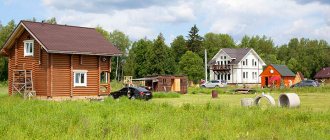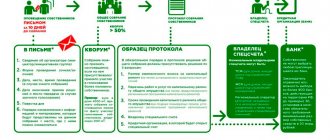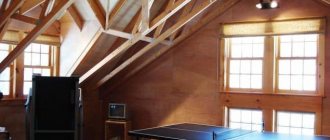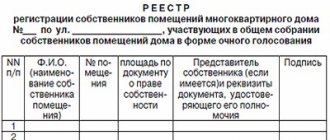Homeowners association concept
According to Art. 291 of the Civil Code of the Russian Federation, owners of premises in an apartment building, as well as owners of residential buildings, can create a homeowners’ association (HOA) for the purposes of:
- Joint management of common property in one or more apartment buildings
- Sharing of property belonging to premises owners
- Carrying out activities to create, maintain, preserve and increase common property
- Carrying out other activities aimed at achieving the goals of managing apartment buildings
Thus, a homeowners’ association is a non-profit organization that is an association of owners of premises in an apartment building for joint management of common property, as well as for achieving other goals related to achieving the goals of managing apartment buildings.
The decision to create an HOA is made by the owners of premises in an apartment building at their general meeting. The minutes of the general meeting are signed by all owners of premises who voted for the decision to create a HOA. One homeowners' association may be created in one apartment building.
As a legal entity, a homeowners' association is subject to state registration and has a seal with its name, as well as bank accounts. The HOA is liable for its obligations with all the property it owns. Wherein:
- The homeowners association is not responsible for the obligations of its members
- Members of the homeowners association do not meet its obligations
The normative basis for the functioning of the HOA is the charter . The HOA charter is adopted at a general meeting of premises owners by a majority vote of the total number of votes.
Article 135 of the RF Housing Code. Homeowners Association (current version)
1. A homeowners’ association is recognized as a type of real estate owners’ association, which is an association of owners of premises in an apartment building for the joint management of common property in an apartment building or, in the cases specified in Part 2 of Article 136 of this Code, the property of the owners of premises in several apartment buildings or the property of the owners several residential buildings, ensuring ownership, use and, within the limits established by law, disposal of common property in an apartment building or joint use of property owned by the owners of premises in several apartment buildings, or property belonging to the owners of several residential buildings, carrying out activities for the creation, maintenance, preservation and growth of such property, provision of utilities to persons using premises in these apartment buildings or these residential buildings in accordance with this Code, with the exception of cases provided for in Article 157.2 of this Code, as well as for carrying out other activities aimed at achieving the goals of managing apartment buildings houses or for the joint use of property belonging to the owners of premises in several apartment buildings, or the property of the owners of several residential buildings.
2. The charter of the homeowners’ association is adopted at a general meeting, which is held in the manner established by Articles 45 - 48 of this Code, by a majority vote of the total number of votes of the owners of premises in an apartment building. The charter of the homeowners association must contain information about its name, including the words “homeowners association”, location, subject and purpose of its activities, the procedure for the emergence and termination of membership in the homeowners association, the composition and competence of the management bodies of the partnership and the procedure for their decision-making, including on issues on which decisions are made unanimously or by a qualified majority of votes, the composition and competence of the audit commission (competence of the auditor) of the partnership, as well as other information provided for by this Code.
2.1. The charter of the homeowners' association may provide for the use of a system or other information system when resolving issues related to the management of the homeowners' association, taking into account the functions of these systems.
3. The number of members of the homeowners’ association who created the partnership must exceed fifty percent of the votes of the total number of votes of the owners of premises in an apartment building.
4. A homeowners’ association is created without limiting the period of activity, unless otherwise provided by the charter of the association.
5. A homeowners’ association is a legal entity from the moment of its state registration. The homeowners association has a seal with its name, a current and other bank account, and other details.
6. The homeowners association is liable for its obligations with all the property belonging to it. The homeowners association is not liable for the obligations of the association members. Members of a homeowners association are not liable for the obligations of the association.
7. If the owners of premises in an apartment building choose a method of managing the apartment building by the homeowners’ association, within five working days from the date of the decision on state registration of the homeowners’ association by the body carrying out state registration of legal entities, the homeowners’ association shall submit information to the state housing supervision body on the choice of a method for managing an apartment building by a homeowners' association and notification of the start of activities to manage an apartment building in the manner established by the federal executive body exercising the functions of developing and implementing state policy and legal regulation in the field of housing and communal services.
7.1. If a homeowners' association concludes an agreement for the management of an apartment building with the management organization of the homeowners' association, within five working days from the date of conclusion of the said agreement, information on the conclusion of the said agreement is submitted to the state housing supervision body in the manner established by the federal executive body exercising the functions of developing and implementation of state policy and legal regulation in the field of housing and communal services.
7.2. In the event of termination or termination of a management agreement for an apartment building concluded between a homeowners' association and a management organization, the homeowners' association, within five working days from the date of termination or termination of this agreement, shall submit to the state housing supervision body information on the conclusion of an apartment building management agreement with another manager organization or notification of the commencement of activities by a homeowners' association to manage an apartment building in the manner established by the federal executive body exercising the functions of developing and implementing state policy and legal regulation in the field of housing and communal services.
8. If the general meeting of owners of premises in an apartment building makes a decision to change the method of managing the apartment building by the homeowners’ association, within five working days from the date of this decision the homeowners’ association shall submit to the state housing supervision body information on the termination of management of the apartment building by the homeowners’ association in the manner established by the federal executive body exercising the functions of developing and implementing state policy and legal regulation in the field of housing and communal services.
Structure of the HOA charter
- The name of the HOA, including the words “homeowners’ association”
- Location of the HOA
- Subject and goals of its activities
- The procedure for the emergence and termination of membership in the HOA
- Composition and competence of the management bodies of the partnership
- The procedure for making decisions by the management bodies of the partnership
- Other information
The Housing Code includes the ratio of the number of HOA members who created the partnership, which must be more than 50% of the total number of votes of the owners of premises in an apartment building, as mandatory conditions for the functioning of a homeowners' association.
Homeowners' Association Rights
- conclude, in accordance with the law, an agreement for the management of an apartment building and other agreements ensuring the management of an apartment building, including the maintenance and repair of common property in an apartment building;
- determine an estimate of income and expenses for the year, including the necessary expenses for the maintenance and repair of common property in an apartment building, costs for major repairs and reconstruction of an apartment building, special contributions and deductions to the reserve fund, as well as expenses for other expenses established by this chapter and the charter partnership goals;
- establish, on the basis of the accepted estimate of income and expenses for the year of the partnership, the amounts of payments and contributions for each owner of premises in an apartment building in accordance with his share in the right of common ownership of common property in the apartment building;
- perform work for the owners of premises in an apartment building and provide them with services;
- use loans provided by banks in the manner and under the conditions provided for by law;
- transfer material and monetary resources under an agreement to persons performing work for the partnership and providing services to the partnership;
- sell and transfer for temporary use, exchange property belonging to the partnership.
In cases where this does not violate the rights and legitimate interests of the owners of premises in an apartment building, the homeowners association has the right to:
- provide for use or limited use of part of the common property in an apartment building;
- in accordance with the requirements of the law, in the prescribed manner, build on, rebuild part of the common property in an apartment building;
- receive for use or receive or acquire land plots into common shared ownership of the owners of premises in an apartment building for housing construction, construction of utility and other buildings and their further operation;
- carry out, in accordance with the requirements of the law, on behalf and at the expense of the owners of premises in an apartment building, the development of allocated land plots adjacent to such a house;
- conclude transactions and perform other actions consistent with the goals and objectives of the partnership.
Creation and operation of a homeowners association
In accordance with the Housing Code, the possibility of the existence of such subjects of housing relations as homeowners’ associations remains possible.
Relations regarding the creation and activities of such partnerships are regulated by the norms of Chapter. 13 LCD.
Homeowners Association
(hereinafter -
HOA)
is recognized as a non-profit organization, an association of owners of premises in an apartment building for joint management of a complex of real estate in an apartment building, ensuring the operation of this complex, ownership, use and, within the limits established by law, disposal of common property in an apartment building (Part 1 of Art. 135 ZhK).
Homeowners Association in accordance with Part 3 of Art. 135 of the residential complex can be created provided that the number of members who created it exceeds 50% of the votes of the total number of votes of the owners of premises in the apartment building.
The Charter of the Homeowners Association is adopted at a general meeting, which is held in the manner established by Art.
45-48 of the Housing Code, by a majority vote of the total number of votes of the owners of premises in an apartment building. A homeowners' association is created without a limitation on the period of activity,
unless otherwise provided by the charter.
A homeowners association is a legal entity from the moment of its state registration
and has a seal with its name, current and other bank accounts, as well as other details.
A homeowners association is liable for its obligations with all the property it owns, but is not liable for the obligations of its members. Members of the Homeowners Association are not liable for the obligations of the Homeowners Association.
According to Art. 136 Residential complex owners of premises in one apartment building can create only one
Homeowners Association.
The decision to create it is made by the owners of premises in an apartment building at their general meeting. Such a decision is considered adopted if the owners of premises in the corresponding apartment building, having more than 50% of the votes of the total number of votes of the owners of premises in such a building, voted for it .
In addition, a Homeowners Association can be created by merging:
- several apartment buildings, the premises in which belong to different (at least two) owners of the premises in the apartment building, with land plots located on a common land plot or several neighboring (bordering) land plots, utility networks and other infrastructure elements;
- several nearby buildings, structures or structures - residential buildings intended for single-family residence, country houses with or without personal plots, garages and other objects located on a common land plot or several neighboring (bordering) land plots, engineering and technical support networks and other infrastructure elements.
Article 137 of the LC defines the rights
Homeowners' Associations. These include the following:
- conclude, in accordance with the law, an agreement for the management of an apartment building, as well as agreements on the maintenance and repair of common property in an apartment building, agreements on the provision of utility services and other agreements in the interests of members of the partnership;
- determine an estimate of income and expenses for the year, including the necessary expenses for the maintenance and repair of common property in an apartment building, the costs of major repairs and reconstruction of an apartment building, special contributions and deductions to the reserve fund, as well as expenses for other expenses established by the housing complex and the charter of the HOA goals;
- establish, on the basis of the accepted estimate of income and expenses for the year of the HOA, the amounts of payments and contributions for each owner of premises in an apartment building in accordance with his share in the right of common ownership of common property in an apartment building;
- perform work for the owners of premises in an apartment building and provide them with services;
- use loans provided by banks in the manner and under the conditions provided for by law;
- transfer material and monetary resources under the agreement to persons performing work for the Homeowners Association and providing services to the partnership;
- sell and transfer for temporary use, exchange property belonging to the Homeowners Association.
In cases where this does not violate the rights and legitimate interests of the owners of premises in an apartment building, the HOA has the right to:
- provide for use or limited use of part of the common property in an apartment building;
- in accordance with the requirements of the law, in the prescribed manner, build on, rebuild part of the common property in an apartment building;
- receive for use or receive or acquire land plots into common shared ownership of the owners of premises in an apartment building for housing construction, construction of utility and other buildings and their further operation;
- carry out, in accordance with the requirements of the law, on behalf and at the expense of the owners of premises in an apartment building, the development of allocated land plots adjacent to such a building;
- conclude transactions and perform other actions consistent with the goals and objectives of the HOA.
If the owners of premises in an apartment building fail to fulfill their obligations to participate in the general expenses of the Homeowners Association, the Homeowners Association has the right to legally demand forced reimbursement of mandatory payments and contributions.
A homeowners' association may demand in court full compensation for losses caused to it as a result of the failure of the owners of premises in an apartment building to fulfill their obligations to pay mandatory payments and contributions and pay other general expenses.
The homeowners association is obliged to:
- ensure compliance with the requirements of Ch. 13 of the Housing Code, provisions of other federal laws, other regulatory legal acts, as well as the charter of the Homeowners Association;
- enter into agreements on the maintenance and repair of common property in an apartment building with the owners of premises in the apartment building who are not members of the Homeowners Association;
- fulfill the obligations under the contract in the manner prescribed by law;
- ensure proper sanitary and technical condition of common property in an apartment building;
- ensure that all owners of premises in an apartment building fulfill their responsibilities for the maintenance and repair of common property in this building in accordance with their shares in the right of common ownership of this property;
- ensure compliance with the rights and legitimate interests of the owners of premises in an apartment building when establishing the conditions and procedure for ownership, use and disposal of common property;
- take measures necessary to prevent or terminate actions of third parties that impede or interfere with the exercise of the rights of ownership, use and, within the limits established by law, of the owners of premises with common property in an apartment building;
- represent the legitimate interests of the owners of premises in an apartment building, including in relations with third parties (Article 138 of the Housing Code).
Article 139 of the Housing Code provides for the possibility of creating a Homeowners Association in apartment buildings under construction
persons who will own the ownership of premises in such houses. The decision to create such a partnership is made at a general meeting of these persons, which is held in the manner established by Art. 45-48 LCD.
Liquidation
The homeowners' association is carried out on the basis and in the manner established by civil law.
As provided in Part 2 of Art. 141 of the Housing Code, the general meeting of owners of premises in an apartment building is obliged to make a decision on the liquidation of the HOA if the members of the partnership do not have more than 50% of the votes of the total number of votes of the owners of premises in the apartment building.
In accordance with Art. 142 LCD two or more homeowners associations can create an association of homeowners associations
for joint management of common property in apartment buildings. Such associations are managed according to the rules of Chapter. 13 LCD, i.e. in the same order as the management of the HOA.
Responsibilities of the Homeowners Association
- ensure compliance with housing legislation and the charter of the partnership;
- carry out management of an apartment building in the manner established by the Housing Code of the Russian Federation;
- fulfill the obligations under the contract in the manner prescribed by law;
- ensure proper sanitary and technical condition of common property in an apartment building;
- ensure that all owners of premises in an apartment building fulfill their responsibilities for the maintenance and repair of common property in an apartment building in accordance with their shares in the common ownership of this property;
- ensure compliance with the rights and legitimate interests of the owners of premises in an apartment building when establishing the conditions and procedure for ownership, use and disposal of common property;
- take measures necessary to prevent or terminate actions of third parties that impede or interfere with the exercise of the rights of ownership, use and, within the limits established by law, of the owners of premises with common property in an apartment building;
- represent the legitimate interests of the owners of premises in an apartment building related to the management of common property in this building, including in relations with third parties;
- maintain a register of members of the partnership and annually during the first quarter of the current year send a copy of this register to the executive authorities of the constituent entities of the Russian Federation;
- submit to the authorized executive authorities of the constituent entities of the Russian Federation, within three months from the date of state registration of changes made to the charter of the partnership, a copy of the charter of the partnership, an extract from the minutes of the general meeting of members of the partnership on the decision to amend the charter, certified by the chairman of the partnership and the secretary of the general meeting of members of the partnership, certified partnership with the attachment of copies of the texts of the relevant changes certified by the chairman of the partnership and the secretary of the general meeting of members of the partnership.
To represent and protect common interests in the management of apartment buildings, two or more homeowners' associations, by agreement among themselves, can create an association (union) of homeowners' associations. The management of such an association is carried out in accordance with the requirements of the legislation of the Russian Federation on non-profit organizations.
The reorganization of a homeowners' association is carried out by decision of the general meeting of premises owners in the manner established by civil law. The Housing Code allows for the transformation of an HOA into a housing or housing-construction cooperative.
Liquidation of a homeowners' association is carried out on the basis and in the manner established by civil law.
The general meeting of owners of premises in an apartment building is obliged to make a decision on the liquidation of the homeowners association if the members of the partnership do not have more than fifty percent of the votes of the total number of votes of the owners of premises in the apartment building.






